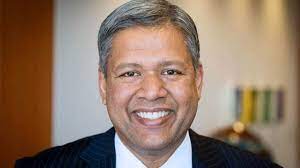By Gavin Mackintosh-
The CEO of Barclays Bank, C. S. Venkatakrishnan, is under pressure to take urgent decisive action in rebuilding trust and implementing a robust framework for accountability, creating an environment of transparency, while encouraging employees to take ownership of their actions.
If follows a number of complaints from unsuspecting customers whose accounts have been defrauded, mysteriously closed down, or had changes made to their accounts without prior knowledge.
The most recent complaint from one of its customers involved a woman whose account was inexplicably overdrawn by over £1.5m, and who complained to the bank without obtaining a satisfactory response.
The Eye Of Media.Com has contacted Barclays bank on at least two occasions in the past years over dissatisfactory services to its customers involving fraud.
On each occasion, the bank was less than satisfactory in its response or assurance to the public that it will overcome complaints of fraud relating to Barclays Bank.
Researchers have also found that fraudsters seeking to defraud customers of their funds often highlight Barclays bank to the collaborators as the preferred Bank for operation because of loopholes and weak links in the institution.
Barclays declined to explain how the overdrawn situation in question came about and what steps it has taken to compensate or appease its victim.
Complaints from customers of Barclays Bank this year alone shows the urgency for the bank to demonstrate a comprehensive ethical framework encompassing the bank’s values, code of conduct, and guidelines for decision-making, ensuring that all employees understand their responsibilities and the consequences of non-compliance.
Customers of Barclays bank spoken to by this publication say Venkatakrishnan needs to prioritize strengthening internal controls and compliance mechanisms within the bank, involving conducting regular audits, implementing robust risk management systems, and establishing an effective whistleblower protection program.
Barclays Plc CEO C.S. Venkatakrishnan who is recovering from a cancer diagnosis, recently spoke to Bloomberg about the merger of UBS and Credit Suisse, investment bankers leaving the firm, commercial real estate, and how higher interest rates impact the bank’s business.
He left out the lack of full accountability among his employees which is affecting the millions of customers whose stored money contributes to his financial standing.
Accountability can be bolstered by setting clear Key Performance Indicators (KPIs) for employees at all levels, particularly responding adequately to complaints. These KPIs should align with the bank’s strategic goals and emphasize ethical behavior and responsible decision-making. Regular assessment and feedback on performance against these indicators will promote accountability and allow for timely course corrections.
One banker who banks with Barclays bank anonymously told The Eye Of Media.Com: Venkatakrishnan also needs to prioritize transparency in reporting to improve accountability, which involves ensuring accurate and timely financial reporting, adhering to regulatory requirements, and providing stakeholders with comprehensive and understandable information.
Transparent reporting builds trust with shareholders, regulators, and the public, leading to enhanced accountability.
”Venkatakrishnan can encourage a culture that supports whistleblowing and protects those who come forward. It can also develop channels for confidential reporting and guarantee non-retaliation against whistleblowers, fostering a culture where misconduct is exposed and addressed promptly.
Venkatakrishnan has been asked to prioritize and establish a reliable and independent board oversight, comprising directors with relevant expertise and a commitment to upholding accountability.
Regular board evaluations, clear role delineation, and effective risk management committees, are all improved mechanisms that will bolster accountability throughout the bank.
Complaints from customers who have experienced issues such as overdraft withdrawal or being locked out of their accounts, puts the responsibility on multiple levels within the organization, including frontline staff, middle management, and executive leadership. CEO C. S. Venkatakrishnan holds ultimate responsibility for creating an environment where customers’ concerns are prioritized, and appropriate systems and support are in place to address them efficiently.
The effectiveness of a CEO can be gauged not only by financial performance, but also through organizational culture, customer satisfaction, and strategic decision-making.




